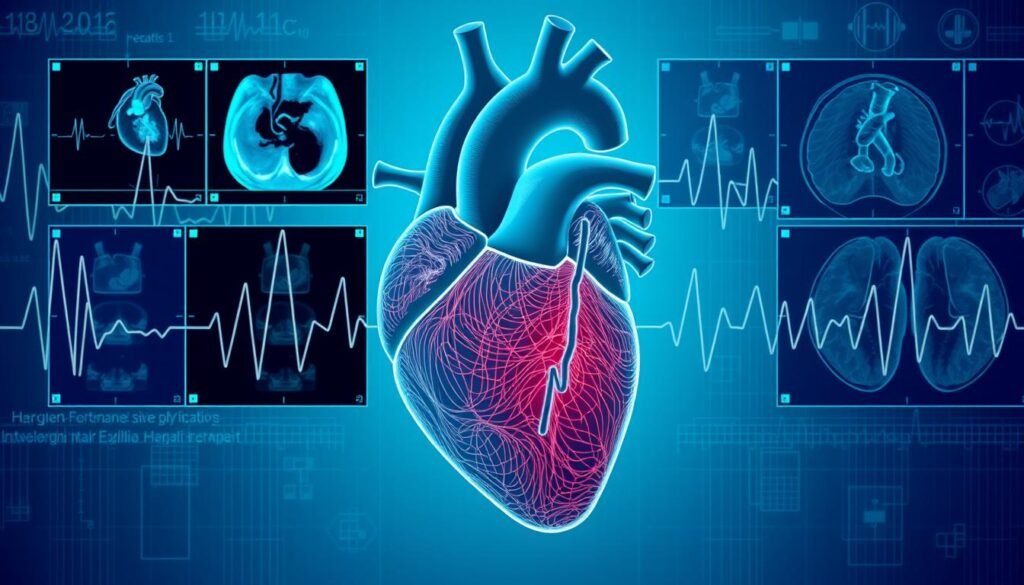Nearly half of all adults in the U.S. have cardiovascular disease, with the most common type being coronary artery disease (CAD). CAD happens when cholesterol builds up and narrows the heart’s arteries. This reduces blood flow and can cause extreme fatigue. Heart fatigue is a serious sign of heart health problems, not just a slight inconvenience. It shows that the heart is getting weaker and not working as well as it should. This article will help you understand what causes heart fatigue, how it affects your life, and ways to treat it. It’s especially helpful for those with chronic heart conditions. You’ll learn about the complexity of heart fatigue and its big impact on everyday activities.
Key Takeaways
- Heart fatigue can severely impact daily activities and quality of life.
- Coronary artery disease is a primary cause of heart fatigue in many adults.
- Identifying symptoms like extreme fatigue is crucial for early intervention.
- Lifestyle changes play a vital role in treating heart fatigue.
- Regular medical evaluations are necessary for managing heart health effectively.
- Understanding one’s risk factors can help prevent cardiac-related issues.
What is Heart Fatigue?
Heart fatigue is a deep tiredness that affects your whole being. It’s feeling bone-tired, in ways that differ from person to person. Some feel this exhaustion all the time; others feel it now and then. Imagine your energy is a battery that runs out too fast, making every day hard to get through. This kind of tiredness from heart issues makes even simple tasks hard to do. It gets in the way of work, fun, and family time.
Defining Heart Fatigue
Heart fatigue happens when your heart can’t pump blood right, leaving you feeling drained. If you’re always tired or out of breath after little activity, take notice. These signs might mean heart trouble and you should see a doctor about it.
The Impact on Daily Life
Dealing with heart fatigue changes your daily life. It makes normal tasks, like work or hanging out with friends, really tough. Feeling unable to join in can make you feel bad about yourself and alone. It’s key to see how heart fatigue touches your whole life. This shows why it’s so important to look into and treat heart health issues.
Common Causes of Heart Fatigue
Knowing why heart fatigue happens can really help manage it. Things like medical problems, how we live, and feelings affect heart energy. Knowing these causes helps people work on better heart health.
Diseases Affecting Heart Function
Many diseases lead to heart fatigue. For example, coronary artery disease and high blood pressure make the heart work harder. This often causes heart failure. Heart failure can happen on the left side of the heart. It comes in two types: HFrEF and HFpEF. Both make life hard for people, causing tiredness and less energy. Sometimes, other illnesses can make the heart suddenly fail, making recovery harder.
Role of Medications
Some heart medicines can make people feel more tired. Drugs for diabetes like rosiglitazone and pioglitazone can harm the heart. Other medicines might also make you tired. It’s important to talk to doctors about medicine side effects. Knowing how medications affect you can help keep your heart healthy resourcefully.
Emotional and Psychological Factors
Feeling emotionally tired also adds to heart fatigue. Things like stress, worry, and sadness can make heart problems worse. This makes getting better harder. Handling these feelings, like reducing stress, can help the heart effectively.
| Causes of Heart Fatigue | Description |
|---|---|
| Coronary Artery Disease | Most common cause of heart failure, leads to reduced blood flow. |
| High Blood Pressure | Increases workload on the heart, eventually leading to fatigue. |
| Medications | Certain drugs can exacerbate fatigue, impacting heart function. |
| Emotional Factors | Stress and anxiety can significantly worsen heart fatigue. |
| Diabetes | Some medications may increase heart failure risk. |
| Sleep Apnea | This disorder is linked to higher risks of heart issues. |
Signs and Symptoms of Heart Fatigue
It’s important to know the signs and symptoms of heart fatigue for quick help. People with heart fatigue often face many physical symptoms in their everyday lives. This condition can also affect their emotional health, making things more complicated. Spotting these symptoms early on can help people get the right support and make their lives better.
Physical Symptoms
Heart fatigue can make even simple tasks feel very hard. Some of the common symptoms include:
- Tiredness doing easy things like bathing or walking
- Having trouble breathing, especially when you try hard
- Feeling pain or discomfort in your chest, like pressure
- Noticing your heart beats in unusual ways
- Feeling extremely tired, which is different from just being tired
These signs show that the heart is under a lot of stress. It suggests you might need to see a doctor.
Emotional Symptoms
Heart fatigue can also cause emotional problems. People might feel:
- Guilty or frustrated because they can’t do everyday activities
- Upset over how their condition affects their life and work
- Worried about their future health and current symptoms
These feelings can make heart fatigue even harder to handle. They can lead to a cycle of stress and tiredness that needs care.
Recognition of Fatigue Levels
Knowing how tired you are is key to managing heart fatigue. Keeping a diary of your energy levels can help. It lets you see what makes your heart fatigue worse. This record is also very useful for doctors to figure out the best way to help you.
Understanding Cardiovascular Exhaustion
Cardiovascular exhaustion happens when the heart can’t pump enough blood, causing ongoing tiredness. This isn’t like the usual tiredness we all feel. It’s worse for those with heart issues. They feel tired all the time, which puts more pressure on the heart and can make other health problems worse.
How It Differs from Normal Fatigue
Normal tiredness gets better with rest and doesn’t last long. It happens to everyone now and then. But cardiovascular exhaustion is different and much harder to deal with. Even easy activities can feel impossible. The body struggles to get enough oxygen and nutrients around, which makes the exhaustion worse.
Direct Impact on the Heart
This kind of exhaustion really affects the heart. It makes the heart less able to do its job. People might get winded doing simple things or feel very tired doing what used to be easy. It often comes from heart diseases like coronary artery disease. It’s important to take care of this to live better.
Myocardial Tiredness: A Deeper Look
Understanding myocardial tiredness helps us see how it affects heart health. It’s about fatigue in the heart muscle from various factors. Learning about its causes and effects lets us understand its role in heart functionality and health better.
What Causes Myocardial Weariness?
Myocardial tiredness happens when blood flow or oxygen to the heart muscle drops. Here are some common reasons:
- Chronic heart conditions, like heart failure
- Coronary artery disease that limits blood flow
- Increased heart workload from high blood pressure
- Too much alcohol, risky when beyond moderate drinking limits
- Psychological stress, worsening heart strain
Consequences of Myocardial Depletion
The effects of myocardial depletion are serious. They change daily life and impact overall health:
- More fatigue with physical activity, limiting what you can do
- Higher emotional tiredness, possibly leading to anxiety or depression
- Chances of declining heart function over time, showing why symptom tracking is crucial
- Risk linked to severe health issues, like heart attacks. Fatigue is especially a subtle sign in women
Diagnosis of Heart Fatigue
To find out if someone has heart fatigue, doctors do a complete check-up. They use tests like echocardiograms, EKGs, and blood tests. These help see how the heart works and check for any problems.
Medical Evaluation and Tests
Experts look closely for signs of heart fatigue when diagnosing heart issues. They watch the ejection fraction rate, which should be 50% or more. This shows the heart is working well. But, a good rate doesn’t always mean the heart is free from issues.
Importance of a Fatigue Diary
Keeping a fatigue diary is very helpful for people with symptoms. It tracks how much energy they have and what activities they do. It also notes any specific symptoms. This diary is useful for talks with doctors.
It helps in figuring out heart problems. So, doctors can make better treatment plans.

Effects of Reduced Cardiac Capacity
Reduced cardiac capacity can harm your heart health, leading to issues like heart failure. When the heart can’t pump blood well, it affects endurance. It’s vital to grasp this to manage heart fatigue properly.
Understanding Heart Failure
Heart failure is when the heart can’t pump blood as needed, often due to decreased cardiac capacity. Causes include coronary artery disease and heart attacks. The resulting decline in function means organs and muscles don’t get enough oxygen and nutrients, causing fatigue.
Correlation between Capacity and Fatigue
A clear link exists between reduced cardiac capacity and more fatigue in people. Studies found that over half of the participants, both men and women, felt very tired due to heart failure. The POMS-F scores, where higher numbers indicate more fatigue, support this with men scoring an average of 7.3 and women 8.7. These findings highlight how physical, emotional health, and even depression, impact tiredness. This shows why it’s critical to act early and adopt healthier habits to boost heart function and lessen fatigue.
| Measurement | Men | Women |
|---|---|---|
| POMS-F Mean Scores | 7.3±5.7 | 8.7±6.1 |
| Fatigue Reporting | 50.4% | 51.2% |
| BDI Score Range | 0-63 | 0-63 |
| Minimal Symptoms on BDI | 0-9 | 0-9 |
| Severe Symptoms on BDI | 30-63 | 30-63 |
Treatments to Alleviate Heart Fatigue
Combating heart fatigue involves a blend of treatments. These include taking meds, making lifestyle shifts, and eating better. Medications are crucial for enhancing heart performance and easing symptoms of heart fatigue. For example, ACE inhibitors like Lisinopril and ARBs such as Losartan are common. SGLT-2 inhibitors, including Empagliflozin and Dapagliflozin, also help in managing heart fatigue and blood sugar.
Medications and Heart Health
The variety of medications for heart health is vast. Older drugs, like hydralazine and isosorbide dinitrate, lower death rates and the need for hospital visits, particularly in African American patients. Diuretics, such as Furosemide, help control fluid retention, easing heart fatigue symptoms. Additionally, anticoagulants are important for lowering the risk of serious problems like heart attacks in those with atrial fibrillation.
Lifestyle Changes for Improvement
Medications aside, lifestyle adjustments can significantly better heart fatigue.
Regular moderate workouts boost heart health. Also, practices such as mindfulness and yoga reduce stress, improving overall well-being. These lifestyle changes are key in managing fatigue and enhancing life quality.
Heart-Healthy Nutrition Tips
Eating right plays a big role in fighting heart fatigue. Choose foods rich in fiber and low in saturated fats to boost heart vitality. Include fruits, veggies, beans, whole grains, and lean meats to better heart function and manage fatigue. Always get advice from healthcare experts for a diet plan that meets your specific health needs. For more details, check out these guidelines.

The Role of Exercise in Combatting Fatigue
It’s key to know how exercise fights fatigue for well-being. Physical activity boosts heart health and energy. It also makes you emotionally stable. Exercise impacts your daily life by offering physical and mental upsides. This is crucial for those feeling tired.
Designing an Exercise Regimen
To start exercising, begin with easy activities and slowly increase effort with a doctor’s guidance. Mix aerobic exercises, like fast walking or biking, with strength workouts for heart benefits. You should do 30 minutes of aerobic exercise five times a week. Also, include weightlifting workouts twice a week. Keeping track of heart rate and reps helps in a safe and efficient regimen.
Benefits of Physical Activity on Heart Health
Consistent exercise brings many heart benefits. It lowers blood pressure, reduces inflammation, and cuts stress hormones. These effects help your heart stay healthy. Moderate exercise can also lessen diabetes risk and heart attack chances. It helps reduce tiredness and boosts your energy and life force. Cancer fatigue sufferers might find special exercise programs helpful for a better feeling. This informative resource has more info.
Exercise is key for better oxygen use and endurance. Creating a workout plan and making it a daily habit is beneficial. Working out with friends, keeping a log, and using tech can motivate you. Exercise helps your body regain energy and improves your mood. It’s crucial in fighting tiredness.
Strategies for Enhanced Myocardial Endurance
To improve your heart’s endurance, it’s key to practice good pacing and rest. Doing so keeps your energy high for daily tasks. It also keeps your heart healthy.
Pacing Techniques for Daily Activities
Pacing yourself is vital for managing energy. Break your tasks into smaller parts to avoid getting too tired. This way, you won’t use up your energy all at once, avoiding exhaustion later.
Prioritize what’s important and know your limits. Set achievable goals each day to keep things manageable. Remember to take breaks often to recover your energy.
Importance of Rest and Recovery
Resting and recovering is essential for your heart’s health. Taking breaks and using relaxation techniques like meditation helps renew your energy. Good sleep is necessary for your body to heal and get stronger.
Adopt a routine that includes daily stress relief. Stick to a regular sleep schedule to recover fully. Pay attention to your body to avoid injuries from overdoing it.

Maintaining Mental Health and Wellbeing
The link between mental health and heart health is strong. Stress, anxiety, and depression can make us feel both emotionally and physically tired. It’s crucial to know how to tackle these mental health issues to keep our hearts healthy.
Link between Mental Health and Heart Function
Research shows that over a third of Americans face depression. Also, one out of every five adults in the U.S. deals with a mental illness. This often leads to poor physical health. Bad mental health can cause heart rate issues and high blood pressure.
Being optimistic and mindful can help your heart. People who are emotionally strong often have lower cholesterol and less inflammation. This is good for your heart’s health.
Dealing with Emotional Fatigue
Managing emotional tiredness takes a few steps. It’s good to exercise for about 150 minutes every week. Doing relaxing activities like yoga or meditation can help reduce stress and anxiety. Also, staying connected with friends and family is key to feeling better.
Getting enough sleep—between seven to nine hours—is also vital. It helps a lot with stress management.
Here’s a table summarizing the relationship between mental health practices and physical health outcomes:
| Mental Health Practice | Impact on Physical Health |
|---|---|
| Regular Exercise | Reduces depression, stress, and anxiety; enhances mood |
| Social Connections | Promotes emotional support, reducing feelings of isolation |
| Sufficient Sleep | Aids in stress management and improves overall health |
| Relaxation Techniques | Decreases blood pressure and promotes better heart function |
| Mindfulness and Gratitude | Associated with lower risk of heart disease |
Talking to healthcare experts can help find the root of stress. They can help make plans to deal with it. Joining relaxation classes or finding support can help improve heart health and deal with emotional tiredness.
Conclusion
Understanding heart fatigue is crucial for effective treatment. About 39% of patients with new heart failure experience clinical fatigue. This calls for targeted care strategies. A study involving over 12,000 patients for nearly five years revealed the complex causes of fatigue, including biological, psychological, and social factors. Depression is strongly linked to fatigue, highlighting the need to include mental health in treatment.
A holistic approach can greatly improve heart health. It combines medical treatments, lifestyle changes, and mental health support. Volume depletion and body mass index are key in predicting fatigue, pointing out the importance of personalized care. Though fatigue doesn’t strongly impact six-month mortality rates, it’s a major concern for patients recovering from heart issues. Resources like PubMed Central offer insights into further research on this topic.
Improving life quality with heart fatigue is tough but possible with the right strategies. Patients should actively participate in their care. Regular check-ups and talks with healthcare providers promise a brighter future for heart health.